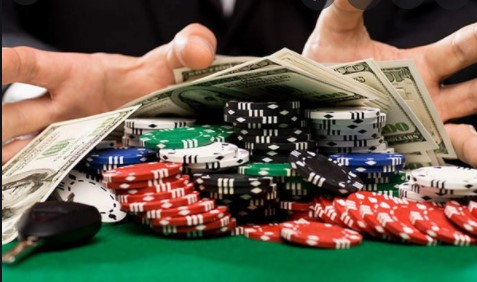There’s no doubt that we’re living in an internet age, so it is not surprising that there’s been a massive increase in poker players due to internet poker tournaments. However, you have to consider the vast differences between standard poker and internet poker. Many players who appear to dominate the digital world find themselves panic when making the jump into an actual game. They’re also left broke and do not understand why.
The main difference between both of these kinds of poker is the lack of real interaction. Learning people’s tells is among the most important skills a poker player can master. On the internet, there are no tells. All you can expect is that you notice other players’ betting patterns. Memorizing principles, learning strategies, and comprehension statistics are essential, but if you learn how to read folks properly, you can be successful with almost any hand.
Playing online is considerably cheaper, and that is not because you do not have to dish out cash for a custom poker chip set or poker table supplies. Unless you are holding a match in your home, you need to pay for transport to a casino. Any gracious participant knows that you should be tipping your dealer, servers, and other casino personnel. After playing for a couple of hours, you are sure to build up quite an appetite and desire, and casino food is not affordable. While at home, you can heat that leftover pizza in the refrigerator as you bounce around from the virtual table.
Regardless of the lack of actual social interaction, online poker has numerous benefits. Besides having the ability to play on your mind, you can make money quickly. Unless you are a high roller playing with fancy tournaments using a cost of half a million, it will take a while for you to begin earning severe cash. On the internet, you can play several reports simultaneously and at a significantly faster pace. There’s no waiting for the dealer to shuffle and deal cards. But when you go from playing online to offline, you are more likely to become impatient as you are not playing as many hands as usual. You may also end up playing hands that you ought to have folded because you are eager to play.
Playing online poker is a terrific learning resource and the perfect way for a novice to learn new skills. Before, novice players may feel intimidated the first few times they play in a casino. If you don’t have someone to escort you, the principles, vocabulary, and strategies are alien to you. Going to a casino could be a nerve-wracking ordeal for new players, but if you’ve spent months playing online, you’ve undoubtedly built up a little bit of confidence in your playing skills.
Online practice, reading poker books and watching poker DVDs can all help you match your game. You must eventually get away from the computer to play poker. Online poker is a great source of information and entertainment, but it should not be your sole method of playing. Traditional poker is a great way to improve your game.
Online poker is a great option for those who enjoy playing a lot of poker. These are the main reasons that poker has gained so much popularity online. Although online poker offers a completely different experience, the rules are the same. Here are the real benefits.
Faster play:
Between online poker and the real world, this is one of the principal differences. There are more chances for gamers to perform hands in online poker than in the real world. The main reason is that dealing and shuffling, in addition to the counting of the cash, are being done automatically. Thus there is no more waiting that contributes to more play and less shilly-shallying.
Play multiple tables:
Many players prefer to play several games simultaneously, which could not occur in a casino. In online poker sites, though, a player is permitted to open quite various rooms. This means that they can have more hands in one hour and have many opportunities in winning though plenty of chances of losing too.
Affordable games for all:
People who prefer to play but can not afford to lose have the choice to play games for as little as a few pennies per hand when playing online. This is something that would never occur at a casino because it’s simply not profitable.
Play any time:
Although casinos are open night and day, never closing, they’re not easily within reach of all the people who enter a casino. This makes playing poker a delightful treat once in a while rather than on an everyday basis. In Contrasting with real-world poker, online poker is available anytime and anywhere as long as you have a computer and an online connection.
Play for just a few moments:
There’s no use in visiting a casino if you are going to play a few hands, but logging into an online poker site for a few minutes is no big deal in any way. It’s easy to pop on and play a few hands during a commercial if you are watching television or on a lunch break if you are on the job.
Play with strangers:
Poker is typically only a social activity done with buddies, especially if there are no casinos near your region. Yet, with online poker, you can be exposed to various playstyles and challenging scenarios since the players they play are from all around the world. This is a superb bonus in logging on.
It is excellent practice:
Practicing poker on the world wide web is very simple and accessible because there is a cheap and even free poker table online. Anyone who would like to progress their playing of poker may log on to any internet poker website, and within an hour, you’ll be able to play dozen of hands. This gives them more idea about the best way best to play the game because they are exposed to many diverse styles of playing.
Though with all these advantages, remember that even so, it is still gambling. Online poker may seem to be as enthralling as it is; keep in mind to play only within your limits.
Venturing from the digital felt to the tangible buzz of a live poker room is a journey laden with psychological intricacies. This pivotal transition unfolds a tapestry of challenges, uniquely colored by the vibrant dynamics of live gameplay. Picture this: the hushed clatter of chips, the subtle dance of cards on the table, and the piercing gaze of opponents just a breath away. It’s a realm where the game’s mental intensity escalates dramatically. Such a setting can either forge a player into a sharper strategist or lead them astray into a maze of rash decisions.
Embarking on this journey, one finds that mastering emotional control becomes paramount. In the virtual world of online poker, your emotions roam free, masked behind the screen. Yet, in the palpable reality of a live game, maintaining a poker face is an art. It’s a skill that cloaks your tells, shielding you from the prying eyes of your adversaries. The live arena demands more; it’s a stage where understanding the nuanced interplay of bluffing, deciphering body language, and sustaining a calm exterior is not just advantageous but essential.
Diving deeper, let’s explore the realm of bankroll management, a discipline often overlooked yet critical in distinguishing the online and live poker experience. The live tables can beckon with higher stakes and a more languid pace, presenting a different financial battlefield. It’s a common tale – many online warriors, accustomed to the digital speed and lower stakes, find themselves misjudging their financial arsenal when they step into the live arena. Thus, effective bankroll management becomes your shield; it’s about setting prudent limits, grasping the nuances of table stakes, and tailoring your strategy to the rhythm of your resources.
Now, let’s not forget the vibrant social tapestry that live poker weaves. It’s a chance to build connections within the poker fraternity, an often-underrated aspect of the game. Networking in live poker circles can unlock doors to advanced strategies, insights into diverse casino environments, and the wisdom of seasoned players. It’s this social dimension that can add depth and richness to your poker repertoire.
Navigating the legal and ethical corridors of poker is another chapter in this journey. The laws of gambling and poker are as varied as the cards in a deck, changing with regions and jurisdictions. Awareness and adherence to these legal landscapes are crucial for every player, ensuring that their passion for the game aligns with the boundaries of the law. Moreover, the sword of responsible gaming should always hang high. Poker, in any form, holds the allure of addiction; players should tread this path with caution, embracing the thrill of the game while acknowledging its risks.
In summary, the odyssey from online to live poker is not merely about shifting strategies. It’s a holistic transition, demanding an understanding and adaptation to the psychological, social, and financial facets of the game. With a balanced approach and a mindful attitude, players can navigate this journey, enriching their experience and perhaps, their mastery of the timeless game of poker.

